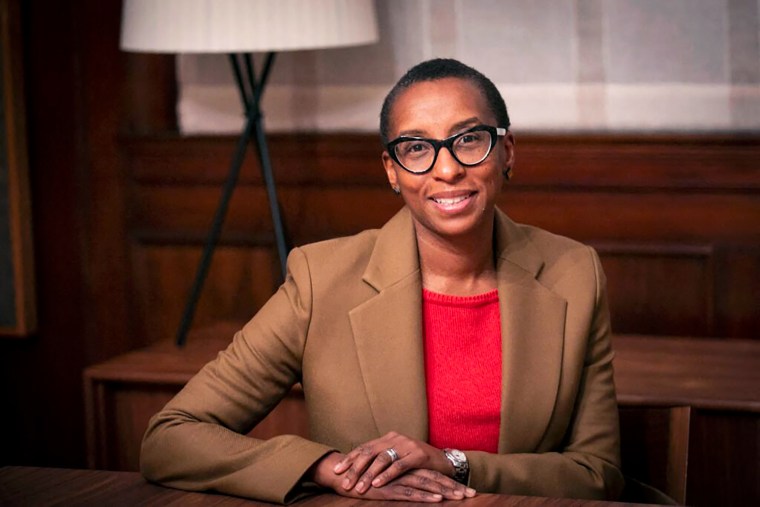Eden Getahun was ecstatic when, just 13 months ago, she learned Harvard University would have its first Black female president. But she sensed even then that Claudine Gay, a prominent African American studies scholar, would face harsh obstacles leading the predominantly white institution.
There was “excitement and hope in terms of what it represents for Black women everywhere to see someone like them in a position of authority like this,” said Getahun, a Black woman and a junior studying social studies at Harvard. “But I did, from the very beginning, recognize there is a chance that she is just going to be used as a puppet of the institution. This situation has proven she still is a victim of these controlling forces.”
Gay resigned as president of the university Tuesday after she faced backlash for her testimony at a congressional hearing last month about antisemitism on U.S. campuses, which was followed by allegations of plagiarism. The charge was largely led by conservative activists who deemed her a “diversity hire.”
The Harvard Corporation, which oversees the university’s governance, has not yet responded to a request for comment. In a statement issued Tuesday, the corporation said it had accepted Gay’s resignation “with sorrow” and condemned the “repugnant and in some cases racist vitriol directed at her through disgraceful emails and phone calls.”
Getahun and Aimee Howard are both members of the Association of Black Harvard Women, but are not speaking on behalf of the organization. They say their situation is a “disappointing” reminder of the ways Black women are undermined and scrutinized no matter how high up the ranks they climb.
“It’s really heart-wrenching,” Howard, a Harvard junior government and African American studies major, said of Gay’s resignation. “It’s very telling that this type of scrutiny, this type of backlash,” was aimed at the university’s “first Black woman president. I feel like Claudine Gay is becoming the scapegoat for everything.”
Pressure for Gay’s resignation mounted after last month’s hearing, when she appeared to avoid questions about whether calls for the genocide of Jews violated college conduct rules. Gay, alongside Liz Magill, then the president of the University of Pennsylvania, and Sally Kornbluth, the president of the Massachusetts Institute of Technology, condemned antisemitism and Islamophobia in broad terms. But when they were asked whether calls for the genocide of Jews would break college codes of conduct, Gay said “it depends on the context” and added that antisemitic rhetoric would be considered “bullying, harassment, intimidation.”
The comments were widely condemned, including by the White House. Magill resigned days after the hearing, and Kornbluth is facing increasing calls to step down. While Kornbluth initially faced less ire, activists are signaling their attention will turn to her now that Gay has stepped down.
Right-wing attacks on Gay were swift, with conservative activists like Christopher Rufo and billionaire investor Bill Ackman using the situation and allegations of plagiarism to attack diversity, equity and inclusion initiatives. Getahun and Howard said they did not feel Harvard did enough to protect Gay from the targeted right-wing attacks.
The campaign against Gay has only shown “the intense standard” that Black women are held to, Getahun said. “As you get higher up, it doesn’t afford you more safety but makes you more subject to that scrutiny. If it had been a white male in her position, as you get higher up, you’re afforded more impunity.”
Last month, more than 700 members of Harvard’s faculty signed a letter urging the administration to keep Gay. And it looked like the university would. On Dec. 12, the Harvard Corporation announced it would allow Gay to remain in her role, saying in a statement that “we today reaffirm our support for President Gay’s continued leadership of Harvard University.” The corporation addressed allegations of plagiarism, saying an investigation “revealed a few instances of inadequate citation” but no violation of Harvard’s standards for research misconduct.
Gay acknowledged the attribution issues in her past work and said she requested corrections for the articles in the appropriate academic journals.
Gay decried the “racial stereotypes” used to attack her in a New York Times op-ed published after her resignation Wednesday and wrote that she regretted not having condemned calls for a genocide of Jewish people as “abhorrent and unacceptable.” She did, however, defend her research in the op-ed and expand on the circumstances surrounding her resignation.
“It is not lost on me that I make an ideal canvas for projecting every anxiety about the generational and demographic changes unfolding on American campuses: a Black woman selected to lead a storied institution,” Gay wrote. “Someone who views diversity as a source of institutional strength and dynamism. … Someone who believes that a daughter of Haitian immigrants has something to offer to the nation’s oldest university.”
Both Black and non-Black leaders and supporters have shared similar sentiments, linking the scandal to anti-Blackness, white supremacy and right-wing attacks on education.
Kyla Golding, a Black Harvard senior, wrote in an op-ed in the student newspaper, The Harvard Crimson, that “at the mountaintop for the Black woman, there is no promised land. No liberation, no forgiveness, no love, no protection.”
“As if surviving the cruel cold misogynoir of the world while simultaneously being burned by the heat emanating through the intensified pressure Black women constantly face isn’t enough to conquer; the higher up she goes the thinner the altitude gets,” Golding wrote.
For more from NBC BLK, sign up for our weekly newsletter.

